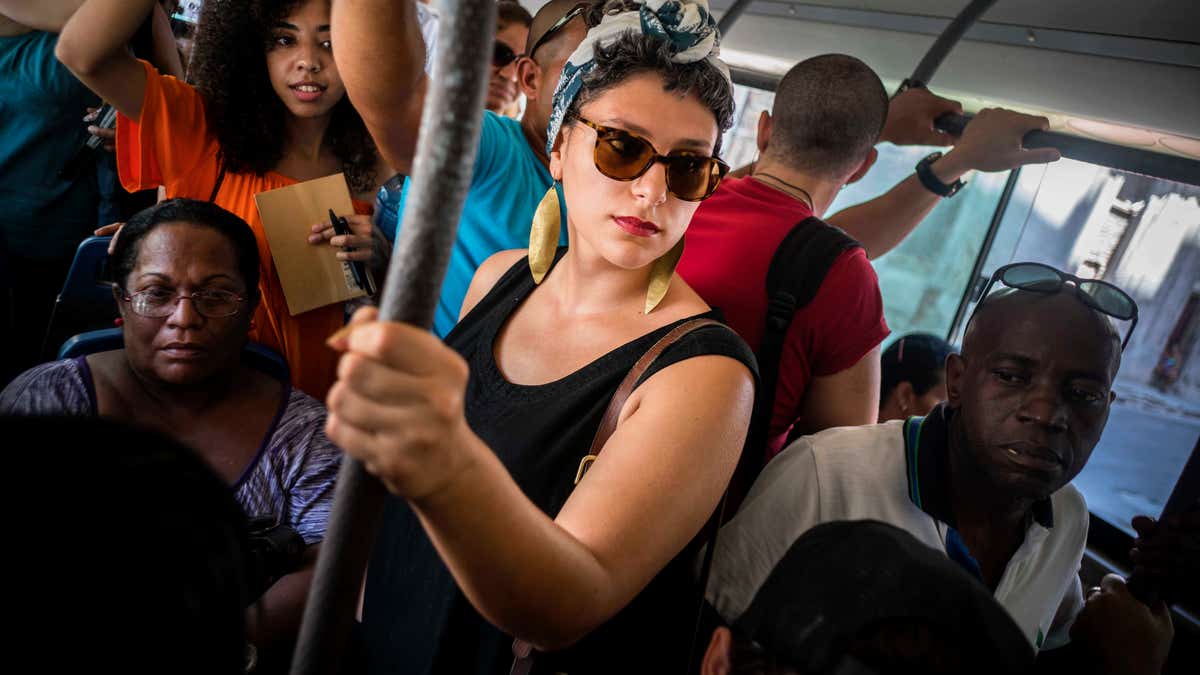
En esta foto del 12 de junio de 2016, la cubanoestadounidense Fontaine Capel, centro, viaja en autobús en La Habana, Cuba. Capel viajó a Cuba con CubaOne, un programa inspirado en el restablecimiento de las relaciones entre Estados Unidos y Cuba. (AP Foto/Ramon Espinosa) (ap)
Cuban authorities are ordering power-saving measures across the island in order to deal with an energy crisis that could lead to blackouts and hit basic services.
The Communist Party newspaper Granma reported that some state-run entities are reducing hours of operation and in some cases fuel allotments for agencies’ vehicles had been cut in half.
Bank and currency exchange house workers said they are using air conditioning just three hours during the eight-hour workday. Some government workplaces have suspended bus service for employees and reassigned drivers to other tasks.
A senior official at the Center for Marti Studies, part of the Culture Ministry, said the workday there now ends at 12:30 p.m. and employees must turn off air conditioning units by 11:30 a.m.
The power-saving measures are expected to continue through the end of August, spanning the two hottest months of the year when power consumption typically spikes.
Speaking to members of parliament, Marino Murillo, Cuba's vice president in charge of economic matters, said Monday that the country's financial situation has been hurt by falling prices for nickel, a key export; missed production targets in the sugar industry; and problems in other unspecified sectors.
Phone calls by the AP to other ministries to ask about their hours of operation revealed that a shortened workday is not in place across all government entities.
There have been rampant rumors and concerns about belt-tightening recently among Cubans, fed by sporadic power outages and a lack of official information before Murillo's comments.
Carmen Gomez, a 75-year-old resident, said her 10 de Octubre neighborhood was hit by two blackouts Monday night and early Tuesday lasting about an hour each.
"In the middle of this unbearable heat!" Gomez said.
Outages have awakened memories of the "Special Period" of the 1990s, when the Soviet Union's collapse gutted the Cuban economy and resulted in hours-long blackouts and widespread shortages — although there is no sign the island is on the verge of that kind of extreme austerity now.
About half of Cuba's energy needs are covered by oil it receives on preferential terms from South American ally Venezuela, a little under 100,000 barrels a day.
Jorge Pinon, an energy analyst at the University of Texas, said maritime traffic data suggest there has been no reduction in those shipments despite Venezuela's deepening economic and political crisis.
But, he said, in the last five years Cuba has seen energy consumption rise 30 percent in the non-state sector as nearly a half million people began running or working for restaurants, cafeterias and other private small businesses opened under economic reforms. Generating capacity, meanwhile, has remained about the same, he said.
In addition, travel to Cuba is booming amid the diplomatic detente with the United States. Pinon noted that high-end hotels can't simply turn off air conditioning without discouraging tourism, which is an increasingly important pillar of Cuba's economy.
"You have all the self-employed workers who are now running electric ovens, microwaves or whatever, and the hotels are full," Pinon said. "So the electric power system, in my opinion, is at its max of capacity."
He said, Cuba might also be holding down energy use to bolster fuel reserves in case of any disruptions during the summer hurricane season or as a hedge against instability in Venezuela.
Based on reporting by the Associated Press.
